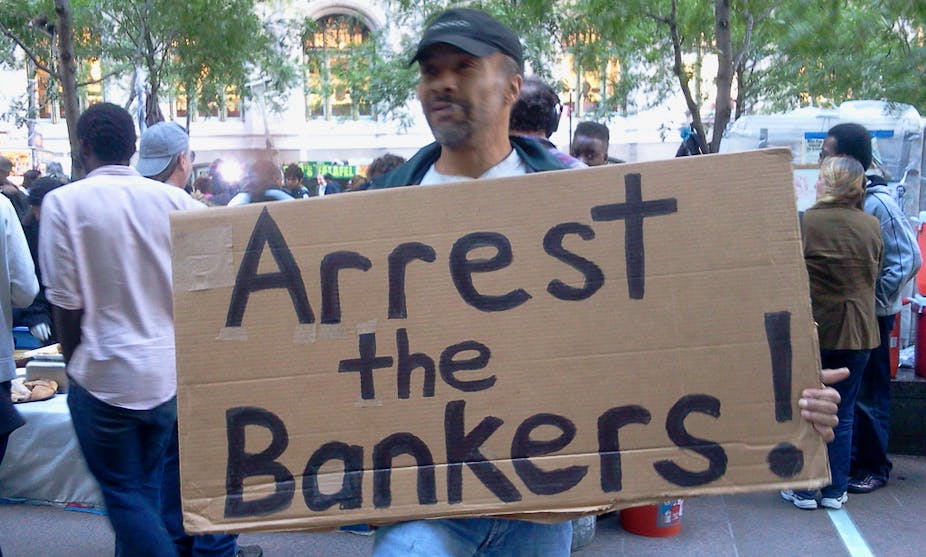Whisper it, but consumer faith in the finance industry might just be on the rebound. Finally, as economic conditions become more benign, our perceptions of the people we rely on to look after our wealth appear to be improving. We’ve waited a long, long time for such a shift: now we need to figure out how to sustain it.
At the Centre for Risk, Banking and Financial Services we’ve been compiling data for our Trust and Fairness Indices since late 2009. The only independent benchmarks of their kind in the UK, the indices use responses from online surveys of thousands of consumers to gauge how the industry is viewed.
We divide financial services providers into seven categories – investment companies, banks, building societies, brokers/advisers, credit card companies, life insurance companies and general insurance companies – and award index scores of between +100 and -100. Scores below zero indicate a perceived lack of trustworthiness/fairness, while scores above zero reflect increasing trustworthiness/fairness. The scores from the latest round of data reveal good news and bad news.
The good news is that perceptions of the industry as a whole seem to be recovering. Chief among the providers bouncing back are investment companies, whose scores for both indices have rallied considerably since the middle of 2013, and credit card companies, which have gradually progressed from laggards to mid-table. Investment companies have no doubt benefited from the recuperation of the markets; credit card companies are reaping the rewards of new practices, introduced by the UK Cards Association in 2011, to encourage fairer and more balanced treatment of customers.
The bad news is that perceptions remain essentially underwhelming, even though in many cases they’re better than they were. Most are still mired in negative territory. And in some instances they’re on the slide.
Traditionally, brokers and advisers have led both indices by a country mile. In large part this is because customers appreciate the human touch. Yet the latest data shows perceptions of brokers/advisers are slipping.
One explanation is found in a new set of rules recently introduced to enhance transparency and fairness in the UK investment industry, as a result of which financial advisers have to agree fees with their clients upfront and can no longer earn commissions from fund companies in return for selling or recommending their products. The advent of more explicit charging seems to have encouraged customers to re-evaluate the levels of service they receive relative to what they pay, sparking a spell of retrospective resentment that may or may not endure as the longer term impact of the rule changes becomes clear.
Bankers still bashed
The picture for banks is even worse. Their trust index score is the lowest since data collection began. This suggests any attempts the banking sector has made to repair its battered image in the aftermath of the financial crisis have failed and that banks continue to assume – quite wrongly – that their own indifference is matched by that of their customers.
Failings like these are often rooted in apathy and arrogance. What’s becoming ever clearer is that they’re no longer easily forgiven now that customers are keenly aware of deliberately complex fees, hidden charges and providers’ ingrained assumptions of unwavering client loyalty.
What many consumers would really like to see is a unilateral commitment to building trust and ensuring fairness. They need to know that the people and organisations they deal with are making their own efforts to understand what these principles mean from a customer perspective. They need to feel they have a direct connection with their providers rather than one filtered through the paternalistic prism of a regulatory authority.
At present the phenomenon of “forced trust” prevails. This stems from a conviction among disaffected customers that they have no choice but to trust their providers, even though that trust hasn’t been earned in any meaningful way. Such a “fingers crossed” philosophy feeds some of the most damaging stereotypes attached to the industry. It underpins a client-provider relationship that should satisfy neither party. It bolsters accusations of facelessness and further entrenches the impression that levels of service are unlikely to transcend the functional and might even prove downright unavailing.
Historically, few providers, from banks down, have given too much thought to this concern. It would be heartening to believe this is changing and that some of the positive trends now emerging from our research could be traced to more than the bottom-line realities of an economic upturn.
The road to redemption is still a long one. We’re witnessing steps in the right direction, but whether they became strides remains to be seen. The most cursory examination of the data is sufficient to confirm there’s an enormous amount of work still to be done. So, yes, whisper it. But there’s not enough to shout about just yet.

